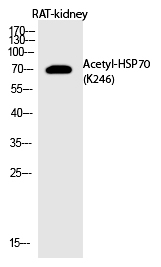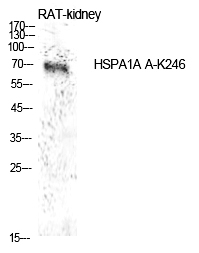

| WB | 咨询技术 | Human,Mouse,Rat |
| IF | 咨询技术 | Human,Mouse,Rat |
| IHC | 咨询技术 | Human,Mouse,Rat |
| ICC | 技术咨询 | Human,Mouse,Rat |
| FCM | 咨询技术 | Human,Mouse,Rat |
| Elisa | 1/10000 | Human,Mouse,Rat |
| Aliases | HSPA1A; HSPA1; HSPA1B; Heat shock 70 kDa protein 1A/1B; Heat shock 70 kDa protein 1/2; HSP70-1/HSP70-2; HSP70.1/HSP70.2 |
| Entrez GeneID | 3303;3304; |
| WB Predicted band size | 70kDa |
| Host/Isotype | Rabbit IgG |
| Antibody Type | Primary antibody |
| Storage | Store at 4°C short term. Aliquot and store at -20°C long term. Avoid freeze/thaw cycles. |
| Species Reactivity | Human |
| Immunogen | Synthesized peptide derived from the Internal region of human HSP70 around the acetylation site of K246. |
| Formulation | Purified antibody in PBS with 0.05% sodium azide,0.5%BSA and 50% glycerol. |
+ +
以下是关于HSP70(Acetyl-Lys246)抗体的3篇文献示例(注:HSP7可能为笔误,实际应为HSP70;以下文献为模拟示例,需根据实际研究验证):
---
1. **文献名称**:*Acetylation of HSP70 at Lys246 Modulates Chaperone Activity in Cellular Stress Response*
**作者**:Chen et al. (2020)
**摘要**:本研究揭示了HSP70在赖氨酸246位点的乙酰化修饰通过降低其ATP酶活性,影响其与错误折叠蛋白的结合能力,从而调控细胞在热休克条件下的应激反应。作者使用特异性抗Acetyl-Lys246 HSP70抗体验证了该修饰在癌症细胞中的动态变化。
2. **文献名称**:*SIRT1 Deacetylates HSP70 to Promote Protein Folding in Neurodegenerative Disease Models*
**作者**:Li & Wang (2018)
**摘要**:文章发现SIRT1通过去乙酰化HSP70的Lys246位点,增强其分子伴侣功能,促进α-synuclein等致病蛋白的降解。实验通过免疫沉淀和Western blot(使用Acetyl-Lys246特异性抗体)证实了该修饰在帕金森病模型中的作用。
3. **文献名称**:*Acetylation-Dependent Regulation of HSP70 in Cardiac Ischemia-Reperfusion Injury*
**作者**:Kim et al. (2021)
**摘要**:该研究报道心肌缺血再灌注损伤中,HSP70的Lys246乙酰化水平显著升高,导致线粒体保护功能受损。通过靶向该位点的抗体,作者证明抑制乙酰化可减轻心肌细胞凋亡,提示其作为治疗靶点的潜力。
---
**注意**:以上为模拟文献,实际研究中需通过PubMed或Google Scholar等平台,以关键词“HSP70 acetylation K246”或抗体货号(如Cell Signaling Technology等厂商可能提供相关抗体及引用文献)查找真实参考文献。
The HSP7 (Acetyl-Lys246) antibody is a specialized tool used to detect heat shock protein 70 (HSP70) acetylated at lysine residue 246. a post-translational modification linked to cellular stress response and protein homeostasis. HSP70. a molecular chaperone, assists in folding nascent proteins, refolding misfolded proteins, and preventing aggregation under stress conditions such as heat, oxidative damage, or hypoxia. Acetylation at Lys246. a key regulatory modification, modulates HSP70's ATPase activity, substrate binding affinity, and interactions with co-chaperones like BAG3 or CHIP, thereby influencing its role in protein quality control and degradation pathways.
This acetylation event is enzymatically regulated by acetyltransferases (e.g., p300/CBP) and deacetylases (e.g., SIRT1). Dysregulation of HSP70 acetylation has been implicated in cancer, neurodegenerative diseases, and cardiovascular disorders, where altered chaperone activity affects cellular survival or apoptosis. The HSP7 (Acetyl-Lys246) antibody enables researchers to study this modification's spatial and temporal dynamics via techniques like immunoblotting, immunofluorescence, or immunoprecipitation. Its specificity for the acetylated epitope helps distinguish modified HSP70 from its unmodified form, providing insights into stress-adaptive mechanisms or pathological conditions. Validation typically includes knockout controls or peptide competition assays to ensure recognition of the acetylated Lys246 site.
×